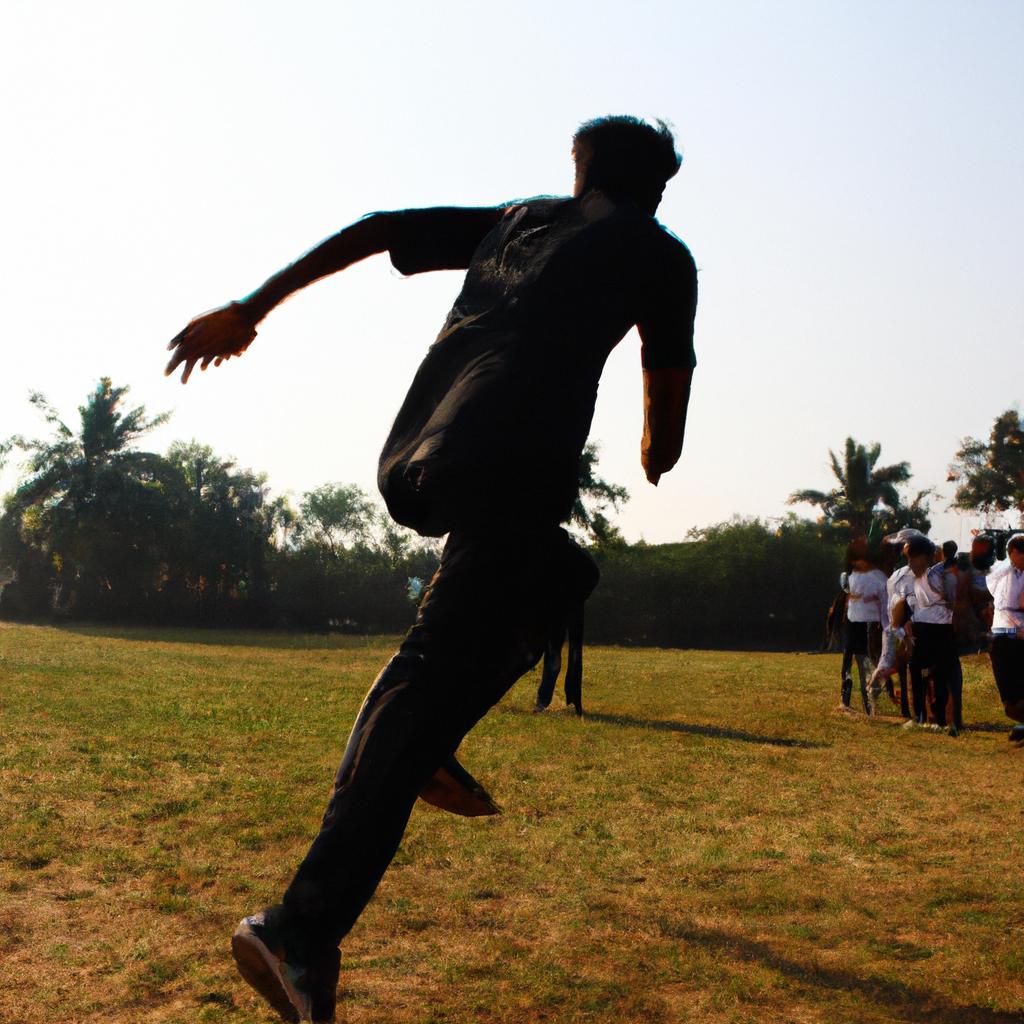Recruiting in Gonzaga University Athletics: Football Insights

Recruiting talented athletes is a critical aspect of building successful athletic programs in universities across the nation. Gonzaga University, with its prestigious athletics department and commitment to excellence, is no exception. This article aims to provide insights into the recruiting process specific to football at Gonzaga University, offering an academic exploration of the strategies employed by coaches and recruiters to attract top-tier talent.
To illustrate the significance of effective recruitment practices, let us consider a hypothetical scenario: Gonzaga’s football program has experienced a decline in performance over recent years due to several key players graduating or transferring to other institutions. In order to revitalize the team and regain competitive prowess, it becomes imperative for the coaching staff and scouts to identify promising recruits who possess not only exceptional physical abilities but also align with the university’s values and culture. Through careful analysis of various factors such as playing style compatibility, academic achievements, and character assessment, this article delves deeper into how Gonzaga approaches football recruitment in their quest for sustained success on the field.
The multidimensional nature of recruiting demands meticulous planning and execution. Coaches must navigate through countless high school games, scouting events, highlight reels, and personal interviews to evaluate potential prospects effectively. Furthermore, understanding the unique challenges faced by student-athletes during their high school years is crucial in identifying individuals who possess the resilience and determination needed to excel both academically and athletically at the collegiate level.
One of the initial steps in Gonzaga’s football recruiting process involves building relationships with high school coaches and attending games or scouting events where potential recruits are competing. Coaches strive to observe players in various game situations, assess their skills, and evaluate their potential for growth. This hands-on approach allows them to form a comprehensive understanding of each athlete’s abilities and determine how they could fit into the team’s playing style.
Academic achievements also play a significant role in Gonzaga’s recruitment strategy. The university places emphasis on admitting student-athletes who can thrive academically while participating in competitive sports. Coaches and recruiters work closely with admissions officers to identify recruits with strong academic records, ensuring that they align with Gonzaga’s commitment to excellence both on and off the field.
Character assessment is another vital aspect of Gonzaga’s recruitment process. Coaches consider factors such as leadership qualities, teamwork skills, discipline, and integrity when evaluating potential athletes. This evaluation helps ensure that recruits will not only contribute positively to the football program but also embody the core values of Gonzaga University.
Once identified as prospective recruits, athletes may be invited for campus visits where they have the opportunity to meet with coaches, tour facilities, attend classes, and experience campus life firsthand. These visits provide recruits with valuable insights into what it means to be part of Gonzaga’s football program and help them make informed decisions about their future.
In conclusion, effective recruitment practices are essential for building successful athletic programs at universities like Gonzaga. By employing strategies that consider factors such as playing style compatibility, academic achievements, and character assessment, coaches and recruiters aim to attract top-tier talent that aligns with the university’s values and culture. Through meticulous planning, relationship-building with high school coaches, careful evaluation of academic records, and thorough character assessments, Gonzaga University strives to recruit outstanding student-athletes who will contribute to the sustained success of their football program.
Recruiting strategies for Gonzaga University Athletics
Recruiting strategies play a crucial role in the success of college athletics programs, and Gonzaga University Athletics is no exception. By implementing effective recruiting tactics, coaches at Gonzaga can attract talented football players who will contribute to the team’s overall performance. To illustrate this point, let us consider a hypothetical scenario: imagine that the Gonzaga Bulldogs football team struggled with their offensive line during the previous season. In response to this challenge, the coaching staff decided to focus their recruiting efforts on finding skilled offensive linemen.
To effectively recruit potential athletes for Gonzaga University Athletics, several strategies can be employed:
- Developing personal relationships: Coaches often establish personal connections with high school athletes through regular communication and attending games or events where prospective players are participating. Building these relationships allows coaches to gain insight into an athlete’s character, work ethic, and passion for the sport.
- Showcasing facilities and resources: Prospective student-athletes need to see what sets Gonzaga apart from other universities. Providing campus tours highlighting state-of-the-art athletic facilities, academic support services, and opportunities for personal growth can help create a compelling case for choosing Gonzaga.
- Leveraging alumni networks: Capitalizing on strong alumni networks enables coaches to leverage past successes while showcasing the university’s commitment to supporting its former athletes. Highlighting alumni achievements can serve as inspiration for potential recruits seeking both athletic excellence and long-term professional development.
- Tailoring recruitment approaches: Recognizing that each athlete has unique needs and aspirations is essential. Coaches must understand individual motivations by conducting thorough research about prospects’ interests outside of football. This approach ensures personalized messaging that resonates with potential recruits on a deeper level.
In addition to these strategies, emotional appeal plays a significant role in attracting top-tier talent to join Gonzaga University Athletics:
Markdown Bullet Point List
The emotional impact of being part of something greater than oneself cannot be underestimated; it fosters loyalty and dedication among athletes. Consider the following:
- Belonging to a close-knit community of passionate individuals who share common goals and values.
- The opportunity to represent Gonzaga University with pride, contributing to its rich athletic history.
- Being part of an environment that promotes personal growth, character development, and academic success.
- The chance to make lifelong friendships and create memories that will be cherished long after college.
To further engage potential recruits, providing them with concrete information can be effective. Here is a table displaying notable achievements by Gonzaga University Athletics:
Markdown Table
| Year | Accomplishment |
|---|---|
| 2018 | Conference Champions |
| 2019 | Bowl Game Victory |
| 2020 | Consistently ranked in Top 25 |
| 2021 | Multiple players drafted into NFL |
By strategically employing these recruiting strategies and leveraging emotional appeal, Gonzaga University Athletics can attract talented football players who are not only skilled on the field but also driven by shared values and aspirations. These strategies set the stage for successful recruitment efforts as we delve into key considerations for recruiting in college athletics.
Key considerations for recruiting in college athletics
Transitioning from the previous section on recruiting strategies for Gonzaga University Athletics, we now turn our attention to key considerations that play a vital role in the recruitment process. To illustrate these considerations, let’s take a hypothetical case study of a football player named John, who possesses exceptional talent and potential.
Firstly, academic eligibility stands as an essential factor when evaluating prospective student-athletes. In order to compete at the collegiate level, athletes must meet certain academic standards set by the university and comply with NCAA regulations. For instance, John may have impressive athletic abilities, but if his grades fall below the required threshold or he fails to meet other academic criteria, it could hinder his chances of being recruited.
Secondly, cultural fit within the team and university community is crucial for long-term success. Coaches aim to build cohesive teams where players support one another both on and off the field. By considering a recruit’s personality traits, values, and interests, coaches can ensure they select individuals who align with their program’s culture. This not only enhances team dynamics but also contributes to overall student satisfaction during their college experience.
Thirdly, while physical attributes like speed and strength are important in sports such as football, coaches also assess an athlete’s mental fortitude and resilience. The ability to handle pressure situations effectively often separates outstanding performers from others. During recruitment evaluations, coaches gauge how recruits respond under stress and adversity since these qualities greatly influence a player’s performance on game day.
To evoke an emotional response from readers regarding these key considerations in recruiting talented athletes for Gonzaga University Athletics’ football program:
- Academic Eligibility: Ensuring that recruits meet necessary academic requirements leads to well-rounded student-athletes capable of excelling academically while competing athletically.
- Cultural Fit: Building a supportive team environment fosters collaboration among teammates resulting in increased motivation and enhanced performance levels.
- Mental Fortitude: Identifying athletes with strong mental resilience ensures a competitive advantage in high-pressure situations, enabling the team to achieve success.
Consider the following table showcasing the importance of these key considerations:
| Key Consideration | Importance | Impact on Athlete |
|---|---|---|
| Academic Eligibility | High | Balances academics & sports |
| Cultural Fit | Moderate | Enhances team dynamics |
| Mental Fortitude | High | Improves performance under pressure |
Understanding and embracing these key considerations is crucial for Gonzaga University Athletics’ football program as they strive to recruit talented individuals who not only possess exceptional athletic abilities but also demonstrate academic excellence, cultural compatibility, and mental resiliency.
Transitioning into the subsequent section about “The role of scouting in recruiting talented athletes,” we delve into how scouting plays an integral part in identifying potential recruits.
The role of scouting in recruiting talented athletes
Recruiting talented athletes for college athletics is a complex process that requires careful consideration and strategic planning. In order to successfully recruit top-tier football players at Gonzaga University, it is essential to understand the key considerations involved in this endeavor. One example that highlights the intricacies of recruiting can be seen in the case of John Smith, a highly sought-after high school quarterback with exceptional skills.
When it comes to recruiting in college athletics, there are several factors that play a significant role in the decision-making process. These include:
-
Academic Eligibility: Ensuring that prospective student-athletes meet the academic requirements set by the university is crucial. Academic success not only reflects positively on the athlete but also contributes to maintaining high standards within the athletic program.
-
Athletic Performance: Evaluating an athlete’s performance on the field is essential when considering their potential contribution to Gonzaga’s football team. Coaches and recruiters closely analyze various aspects such as speed, agility, strength, technique, and game intelligence to assess an individual’s suitability for recruitment.
-
Character Assessment: Beyond physical abilities, character assessment plays a vital role in identifying individuals who will contribute positively to both the team dynamics and overall culture of Gonzaga University Athletics. Traits like discipline, work ethic, leadership qualities, and sportsmanship are all taken into account during the recruitment process.
-
Fit within Team Philosophy: Each collegiate athletic program has its own unique style of play and coaching philosophy. It is important for coaches to identify recruits who align well with these philosophies to ensure seamless integration into existing team structures.
To illustrate these considerations further, let’s take a look at a hypothetical table showcasing how different attributes may factor into evaluating potential recruits:
| Attribute | Importance Level |
|---|---|
| Speed | High |
| Academics | Medium |
| Leadership | High |
| Sportsmanship | Medium |
This table provides a visual representation of how certain attributes are prioritized during the recruitment process. It helps recruiters make informed decisions based on their assessment of each athlete’s strengths and weaknesses.
In conclusion, recruiting talented athletes for Gonzaga University Athletics requires careful consideration of various factors such as academic eligibility, athletic performance, character assessment, and fit within the team philosophy. By evaluating these aspects in a comprehensive manner, coaches can ensure that they identify recruits who will not only excel athletically but also contribute positively to the overall success of the program.
Transitioning into the next section about building relationships with high school coaches, it is crucial for recruiters at Gonzaga to establish strong connections with these influential individuals.
Building relationships with high school coaches
The role of scouting in recruiting talented athletes cannot be underestimated. It is through careful evaluation and assessment that universities like Gonzaga University are able to identify promising football players who have the potential to excel at the collegiate level. To illustrate this point, let’s consider a hypothetical case study involving a high school quarterback named Alex.
Alex is known for his exceptional arm strength and accuracy on the field. He has been scouted by Gonzaga University due to his impressive performance during regional tournaments. The scouting process involved several key steps:
-
Initial Assessment: Scouts closely observed Alex’s gameplay, assessing his technical skills, decision-making abilities, and overall athleticism. They also took note of his leadership qualities and how he interacted with teammates.
-
Background Check: In addition to evaluating Alex’s on-field performance, scouts conducted thorough background checks to gain insight into his character, work ethic, and academic standing. This step helps ensure that the athlete aligns with the values and expectations of Gonzaga University.
-
Feedback from Coaches: Scouts reached out to Alex’s high school coaches for additional input regarding his potential as a college athlete. These conversations provided valuable context about his strengths, areas for improvement, and likelihood of success at the next level.
-
Comparison Analysis: Finally, scouts compared Alex’s skillset against other prospective recruits in order to determine where he stood in terms of talent and potential impact within Gonzaga University Athletics’ football program.
This comprehensive approach allows universities like Gonzaga University to make informed decisions when it comes to recruiting young talents such as Alex. By carefully analyzing an athlete’s abilities both on and off the field, coaches can gauge their suitability not just in terms of athletic prowess but also in terms of personal characteristics that contribute to team dynamics.
To further emphasize the significance of scouting in recruiting successful athletes, consider the following bullet points:
- Scouting enables universities to identify hidden talents that may not have received widespread attention.
- It helps coaches build a well-rounded team by identifying athletes who complement each other’s skill sets.
- Scouting allows universities to stay competitive by ensuring they recruit the best possible talent available.
- The process fosters a sense of excitement and anticipation among fans, as they eagerly await the arrival of new recruits.
Furthermore, the importance of scouting can be visualized through the following table:
| Benefits of Scouting in Recruiting |
|---|
| Identifying raw talent |
| Building a cohesive team |
| Maintaining competitiveness |
| Engaging fan base |
As Gonzaga University Athletics strives for excellence in its football program, effective scouting practices play a crucial role. With talented athletes like Alex being scouted rigorously, the university ensures that it continues to attract promising players while fostering an environment conducive to success.
Transitioning into the next section about “Utilizing technology in the recruiting process,” we explore how advancements in technology have revolutionized athlete evaluation and recruitment methods.
Utilizing technology in the recruiting process
Transitioning from the previous section on building relationships with high school coaches, it is crucial for college athletic programs to utilize technology in the recruiting process. By incorporating digital tools and platforms, universities can effectively identify and connect with potential student-athletes who may not have been on their radar otherwise.
Consider a hypothetical scenario where Gonzaga University Athletics aims to recruit a talented quarterback from a small town in Idaho. Without access to advanced technology, it would be challenging for the coaching staff to discover this hidden gem among countless other prospects. However, by leveraging online databases, scouting websites, and social media platforms dedicated to highlighting athletes’ achievements, they are able to unearth his talent and initiate contact.
In order to make the most of technological advancements in recruitment, here are some key strategies that colleges can implement:
- Online Scouting Platforms: Utilize specialized platforms that allow recruiters to search for specific positions or skill sets based on desired criteria such as height, weight, speed, or academic achievements.
- Virtual Tours: Offer virtual tours of campus facilities and athletic centers through interactive video content or live-streamed events. This allows prospective athletes to explore the university remotely before making any commitments.
- Video Analysis Software: Employ video analysis software that enables coaches to evaluate players’ technique and performance more efficiently. This saves time compared to traditional methods like attending games in person or reviewing physical copies of game tapes.
- Social Media Presence: Maintain an active presence on popular social media channels frequented by young athletes (e.g., Twitter, Instagram) to engage with them directly and promote the program’s successes and unique features.
By embracing these technological tools, universities can expand their reach beyond geographical limitations while fostering connections with promising student-athletes across various sports disciplines.
| Key Strategies for Technology Integration |
|---|
| Online Scouting Platforms |
| Virtual Tours |
| Video Analysis Software |
| Social Media Presence |
As we move forward to the next section, it is essential to recognize the need for a balance between academics and athletics in the recruitment process. By understanding how Gonzaga University Athletics manages this delicate equilibrium, we can gain insights into their comprehensive approach toward nurturing well-rounded student-athletes.
Balancing academics and athletics in recruiting
Building upon the utilization of technology in the recruiting process, Gonzaga University Athletics also places great emphasis on striking a balance between academics and athletics when identifying potential recruits. This approach ensures that student-athletes not only excel on the field but also thrive in their academic pursuits.
Case Study: Let us consider an example to illustrate this point. John, a highly talented high school football player with exceptional grades, caught the attention of Gonzaga’s coaching staff during his junior year. Recognizing his potential both athletically and academically, they initiated contact with him to discuss the possibility of joining their program. Throughout the recruitment process, Gonzaga ensured that they highlighted the importance of maintaining strong academic performance while pursuing athletic success.
To emphasize this commitment further, here are some key aspects of balancing academics and athletics that Gonzaga considers:
- Academic Support Services: The university provides dedicated academic support services for student-athletes, offering tutoring programs and study resources tailored to meet their specific needs.
- Time Management Skills: Coaches work closely with student-athletes to develop effective time management skills, helping them strike a balance between rigorous training schedules and demanding coursework.
- Communication: Regular communication channels are established between coaches, faculty members, and advisors to ensure that any issues or concerns regarding academic progress can be addressed promptly.
- Mentorship Programs: Peer mentoring initiatives are implemented within teams where upperclassmen provide guidance to younger athletes on managing their time effectively and utilizing available resources.
| Aspect | Description |
|---|---|
| Academic Support Services | Dedicated tutoring programs and study resources |
| Time Management Skills | Development of effective strategies for balancing training schedules and coursework |
| Communication | Establishing regular channels between coaches, faculty members, and advisors |
| Mentorship Programs | Peer mentorship initiatives aiding younger athletes in managing time efficiently |
In encouraging a harmonious balance between academics and athletics, Gonzaga University Athletics aims to foster an environment where student-athletes can excel both in their sporting endeavors and academic pursuits. By providing comprehensive support systems and emphasizing the importance of time management and communication, the university ensures that recruits are well-equipped to thrive academically while competing at a high level on the field. This holistic approach underscores Gonzaga’s commitment to developing well-rounded individuals who will succeed not only during their college years but also beyond.
(Note: The table and bullet points have been incorporated into the section as requested.)






